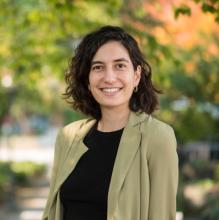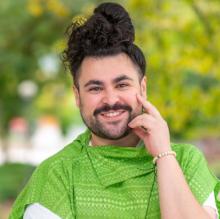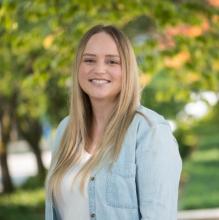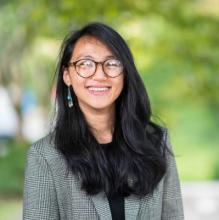Bulmaro Valdés is a PhD candidate in the UBC Biomedical Engineering Graduate Program. He is interested in applying his science and engineering knowledge to help people with disabilities. His research allows him to work directly with stroke survivors and therapists to develop new technological solutions to current rehabilitation issues.
Research Description
My research focuses on finding better and more engaging ways to rehabilitate stroke survivors using technology (robotic devices, motion tracking cameras, and videogames). I am currently looking into the issue of reducing trunk compensatory movements. Stroke survivors tend to use these movements to make up for the loss of upper-limb motor function. However, their long-term use can be detrimental to the recovery process. Existing therapy solutions require physical restraints to secure people to the back of a chair, which is undesirable for unsupervised therapy. As a result, there is a need for alternate methods that promote correct movement patterns in both the clinic and the home. Current active technology and biofeedback emerge as possible solutions to this issue. Consequently, in this project, I will look into the reduction of trunk compensation using robotic devices and commercial motion tracking technology to provide movement feedback.
What does being a Public Scholar mean to you?
It means that you get the opportunity to explore and redefine what a PhD program can be. Sometimes people imagine PhD students as researchers who only work in a laboratory setting, who do not work on “real and practical” solutions, and who keep science to themselves by employing confusing jargon and formulas. I think that with programs like the Public Scholars Initiative we have a chance to change this view by disseminating the knowledge obtained in higher education programs, and delivering a real impact on society and improving the public good.
In what ways do you think the PhD experience can be re-imagined with the Public Scholars Initiative?
The work that all of the public scholars will be developing and the opportunity to disseminate their results to the general public will increase the chances of changing the current view of what a PhD means. Through stronger and more direct connections to the community we will promote a richer experience for both the students and the general public that will go beyond classrooms and laboratories.
How do you envision connecting your PhD work with broader career possibilities?
This project will allow me to work with rehabilitation professionals –therapists, physiatrists, clinic administrators and others – who have substantial experience in the field of stroke rehabilitation. In addition, I will be exposed to the environments where stroke survivors receive therapy. This will give me the opportunity to identify areas of improvement where technology could act as a potential solution, and to develop new ideas for potential research pathways in my future academic employment.
How does your research engage with the larger community and social partners?
Stoke survivors who live in the community are the most important element of my research, and a continuous engagement with them and their therapists are essential to make progress in the area of stroke rehabilitation. In this project, I have been engaging with stroke survivors through a series of presentations at recovery groups run by the Stroke Recovery Association of British Columbia, and by working closely with therapists from local rehabilitations clinics.
Why did you decide to pursue a graduate degree?
After working in a Mexican automation services corporation, I realized that I wanted to not only work with technology, but also help people with my engineering expertise. This took me to the other side of the world to pursue a Master’s Degree in Biomedical Engineering at The University of Sydney, Australia, in which I started working on developing technology for rehabilitation. To continue researching on this fascinating subject I decided to pursue a PhD.
Why did you choose to come to British Columbia and study at UBC?
I was attracted by UBC’s world class biomedical engineering research and professors. Moreover, my supervisor’s expertise in the field of rehabilitation robotics played a significant part on making the decision to come to UBC.
Through stronger and more direct connections to the community we will promote a richer experience for both the students and the general public that will go beyond classrooms and laboratories".




